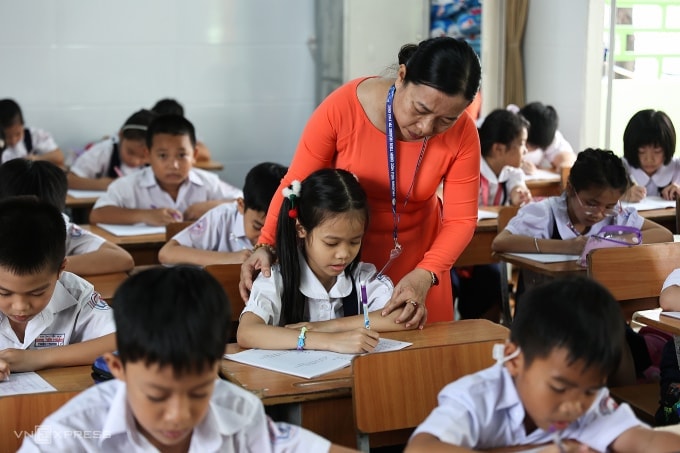The Ministry of Education and Training has abandoned a proposal to spend about VND9,200 billion each year to exempt tuition fees for teachers' children, according to the latest draft of the Teachers Law.

The latest draft of the Law on Teachers proposes to stipulate policies to support teachers, including: Subsidies according to the nature of work and by region; Training and development support policies; Periodic health care, occupational health care...
In addition, teachers working in ethnic minority areas, mountainous areas, border areas, islands and areas with especially difficult socio-economic conditions; teachers teaching in specialized schools, teaching inclusive education; teaching ethnic minority languages; teaching Vietnamese language enhancement for ethnic minority students; teachers teaching gifted subjects and arts are also entitled to some other support.
Thus, the draft law has removed the proposal to exempt tuition fees for biological and legally adopted children of teachers who are still working.
Previously, the Ministry of Education and Training proposed exempting tuition fees for biological and legally adopted children of working teachers, saying that this was the wish of many teachers. Based on the age of teachers and the estimated age of their children, the estimated expenditure is about 9,200 billion VND per year.
Regarding salary and allowance policies, the draft law stipulates that the basic salary according to the teacher salary scale is ranked highest in the administrative and career salary scale system. Professional preferential allowances and other allowances depend on the nature of the job and the region as prescribed by law.
Teachers recruited and ranked for the first time will be ranked one salary level higher in the administrative career salary scale system.
Salaries and salary policies of teachers in non-public educational institutions are guaranteed to be no less than salaries and salary policies of teachers in public educational institutions with the same training level and same title, unless otherwise agreed.
Teachers working in sectors and fields with special policies are entitled to special policies according to regulations and are only entitled to the highest level if that policy coincides with the policy for teachers.
The Government specifies in detail the salaries and allowances for teachers.
Regarding the policy of attracting teachers, the beneficiaries of the policy are highly qualified people, talented people, excellent graduates, young scientists, and people with special talents who participate in recruitment as teachers. Teachers working in particularly difficult areas such as ethnic minority areas, mountainous areas, coastal areas, and islands.
Attraction policies include: receiving attraction allowances and subsidies; ensuring collective accommodation with sufficient essential conditions or renting official housing when working in rural areas, ethnic minority areas, mountainous areas, border areas, islands and areas with particularly difficult socio-economic conditions; support in training and development.
In addition to the policies prescribed by law, teachers in public educational institutions enjoy the policies of attracting civil servants and other attraction policies.
Encourage localities and educational institutions to have policies to attract teachers that are suitable to practical conditions and legal financial resources of localities and educational institutions.
Regarding retirement for teachers, teachers in preschools, if they wish, can retire at a lower age but not more than 5 years older than the regulations and will not have their pension rate deducted due to early retirement.
Working time upon retirement at an older age shall not exceed 5 years for teachers with a doctorate degree; not exceed 7 years for teachers with the title of associate professor; not exceed 10 years for teachers with the title of professor.
Previously, the Ministry of Education and Training - the agency in charge of drafting the Law on Teachers, proposed exempting tuition fees for biological and legally adopted children of working teachers. Based on the age of teachers and the estimated age of their children, the estimated expenditure is about 9,200 billion VND per year. This proposal received many mixed opinions.
The draft Law on Teachers will be submitted and discussed at the National Assembly on November 9.
TH (according to Vietnamnet)